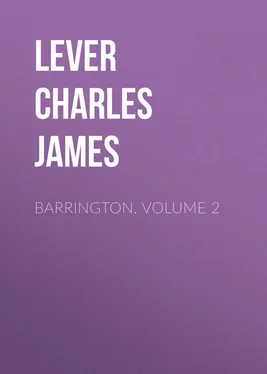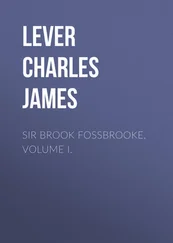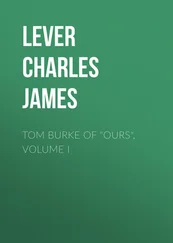Charles Lever - Barrington. Volume 2
Здесь есть возможность читать онлайн «Charles Lever - Barrington. Volume 2» — ознакомительный отрывок электронной книги совершенно бесплатно, а после прочтения отрывка купить полную версию. В некоторых случаях можно слушать аудио, скачать через торрент в формате fb2 и присутствует краткое содержание. Жанр: literature_19, foreign_antique, foreign_prose, на английском языке. Описание произведения, (предисловие) а так же отзывы посетителей доступны на портале библиотеки ЛибКат.
- Название:Barrington. Volume 2
- Автор:
- Жанр:
- Год:неизвестен
- ISBN:нет данных
- Рейтинг книги:4 / 5. Голосов: 1
-
Избранное:Добавить в избранное
- Отзывы:
-
Ваша оценка:
- 80
- 1
- 2
- 3
- 4
- 5
Barrington. Volume 2: краткое содержание, описание и аннотация
Предлагаем к чтению аннотацию, описание, краткое содержание или предисловие (зависит от того, что написал сам автор книги «Barrington. Volume 2»). Если вы не нашли необходимую информацию о книге — напишите в комментариях, мы постараемся отыскать её.
Barrington. Volume 2 — читать онлайн ознакомительный отрывок
Ниже представлен текст книги, разбитый по страницам. Система сохранения места последней прочитанной страницы, позволяет с удобством читать онлайн бесплатно книгу «Barrington. Volume 2», без необходимости каждый раз заново искать на чём Вы остановились. Поставьте закладку, и сможете в любой момент перейти на страницу, на которой закончили чтение.
Интервал:
Закладка:
Charles James Lever
Barrington. Volume 2 (of 2)
CHAPTER I. FIFINE AND POLLY
There are a few days in our autumnal season – very few and rare! – when we draw the curtain against the glare of the sun at breakfast, and yet in the evening are glad to gather around the cheerful glow of the fire. These are days of varied skies, with fleecy clouds lying low beneath a broad expanse of blue, with massive shadows on the mountains, and here and there over the landscape tips of sunlight that make the meanest objects pictures; and, with all these, a breezy wind that scatters the yellow leaves and shakes the tree-tops, while it curls the current of the bright river into mimic waves. The sportsman will tell you that on such days the birds are somewhat wild, and the angler will vow that no fish will rise to the fly, nor is it a scent-lying day for the harriers; and yet, with all this, there is a spring and elasticity in the air that impart themselves to the temperament, so that the active grow energetic, and even the indolent feel no touch of lassitude.
It was on the morning of such a day that Barrington, with his sister and granddaughter, drew nigh the Home. Conyers had parted with them at Dublin, where his regiment was now stationed, but was to follow in a day or two. All the descriptions – descriptions which had taken the shape of warnings – which they had given Josephine of the cottage could not prevent her asking at each turn of the road if that large house yonder, if that sombre tower over the trees, if that massive gate-lodge were not theirs. “I know this is it, grandpapa,” said she, clapping her hands with delight as they came opposite a low wall within which lay the spacious lawn of Cobham Park, a portion of the house itself being just visible through the trees; “don’t tell me, aunt,” cried she, “but let me guess it.”
“It is the seat of Sir Charles Cobham, child, one of the richest baronets in the kingdom.”
“There it is at last, – there it is!” cried she, straining oat of the carriage to see the handsome portico of a very large building, to which a straight avenue of oaks led up from the high-road. “My heart tells me, aunt, that this is ours!”
“It was once on a time, Fifiue,” said the old man, with a quivering voice, and a glassy film over his eyes; “it was once, but it is so no longer.”
“Barrington Hall has long ceased to belong to us,” said Miss Dinah; “and after all the pains I have taken in description, I cannot see how you could possibly confound it with our little cottage.”
The young girl sat back without a word, and, whether from disappointment or the rebuke, looked forth no more.
“We are drawing very near now, Fifine,” said the old man, after a long silence, which lasted fully two miles of the way. “Where you see the tall larches yonder – not there – lower down, at the bend of the stream; those are the trees. I declare, Dinah, I fancy they have grown since we saw them last.”
“I have no doubt you do, Peter; not that you will find the cottage far more commodious and comfortable than you remembered it.”
“Ah, they’ve repaired that stile, I see,” cried he; “and very well they’ve done it, without cutting away the ivy. Here we are, darling; here we are!” and he grasped the young girl’s hand in one of his, while he drew the other across his eyes.
“They ‘re not very attentive, I must say, brother Peter, or they would not leave us standing, with our own gate locked against us.”
“I see Darby running as fast as he can. Here he comes!”
“Oh, by the powers, ye’re welcome home, your honor’s reverence, and the mistresses!” cried Darby, as he fumbled at the lock, and then failing in all his efforts, – not very wonderful, seeing that he had taken a wrong key, – he seized a huge stone, and, smashing the padlock at a blow, threw wide the gate to admit them.
“You are initiated at once into our Irish ways, Fifine,” said Miss Barrington. “All that you will see here is in the same style. Let that be repaired this evening, sir, and at your own cost,” whispered she to Darby, into whose hand at the same moment Peter was pressing a crown piece.
“‘T is the light of my eyes to see your honors home again! ‘Tis like rain to the new potatoes what I feel in my heart, and looking so fresh and well too! And the young lady, she isn’t – ”
From what dread anticipation Darby’s sudden halt saved him the expression is not for me to say, but that Peter Barrington guessed it is probable, for he lay back in the carriage and shook with laughter.
“Drive on, sir,” said Miss Dinah to the postilion, “and pull up at the stone cross.”
“You can drive to the door now, ma’am,” said Darby, “the whole way; Miss Polly had the road made while you were away.”
“What a clever girl! Who could have thought it?” said Barrington.
“I opine that we might have been consulted as to the change. On a matter as important as this, Peter, I think our voices might have been asked.”
“And how well she has done it too!” muttered he, half aloud; “never touched one of those copper beeches, and given us a peep of the bright river through the meadows.”
As the carriage rolled briskly along, Darby, who trotted alongside, kept up a current narrative of the changes effected during their absence.
“The ould pigeon-house is tuck down, and an iligant new one put up in the island; and the calves’ paddock is thrown into the flower-garden, and there’s a beautiful flight of steps down to the river, paved with white stones, – sorrow one is n’t white as snow.”
“It is a mercy we had not a sign over the door, brother Peter,” whispered Miss Dinah, “or this young lady’s zeal would have had it emblazoned like a shield in heraldry.”
“Oh, how lovely, how beautiful, how exquisite!” cried Josephine, as they came suddenly round the angle of a copse and directly in front of the cottage.
Nor was the praise exaggerated. It was all that she had said. Over a light trellis-work, carried along under the thatch, the roses and jessamine blended with the clematis and the passion-flower, forming a deep eave of flowers, drooping in heavy festoons across the spaces between the windows, and meeting the geraniums which grew below. Through the open sashes the rooms might be seen, looking more like beautifnl bowers than the chambers of a dwelling-house. And over all, in sombre grandeur, bent the great ilex-trees, throwing their grand and tranquil shade over the cottage and the little grass-plot and even the river itself, as it swept smoothly by. There was in the stillness of that perfumed air, loaded with the sweet-brier and the rose, a something of calm and tranquillity; while in the isolation of the spot there was a sense of security that seemed to fill op the measure of the young girl’s hopes, and made her exclaim with rapture, “Oh, this, indeed, is beautiful!”
“Yes, my darling Fifine!” said the old man, as he pressed her to his heart; “your home, your own home! I told you, my dear child, it was not a great castle, no fine château, like those on the Meuse and the Sambre, but a lowly cottage with a thatched roof and a rustic porch.”
“In all this ardor for decoration and smartness,” broke in Miss Dinah, “it would not surprise me to find that the peacock’s tail had been picked out in fresh colors and varnished.”
“Faix! your honor is not far wrong,” interposed Darby, who had an Irish tendency to side with the majority. “She made us curry and wash ould Sheela, the ass, as if she was a race-horse.”
“I hope poor Wowsky escaped,” said Barrington, laughing.
“That’s what he didn’t! He has to be scrubbed with soap and water every morning, and his hair divided all the way down his back, like a Christian’s, and his tail looks like a bunch of switch grass.”
Читать дальшеИнтервал:
Закладка:
Похожие книги на «Barrington. Volume 2»
Представляем Вашему вниманию похожие книги на «Barrington. Volume 2» списком для выбора. Мы отобрали схожую по названию и смыслу литературу в надежде предоставить читателям больше вариантов отыскать новые, интересные, ещё непрочитанные произведения.
Обсуждение, отзывы о книге «Barrington. Volume 2» и просто собственные мнения читателей. Оставьте ваши комментарии, напишите, что Вы думаете о произведении, его смысле или главных героях. Укажите что конкретно понравилось, а что нет, и почему Вы так считаете.












